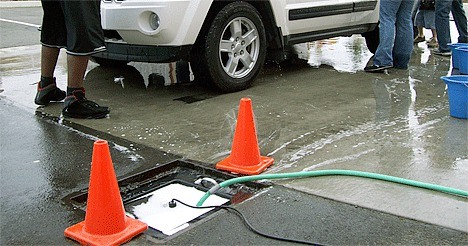A recent report from the Puget Sound Partnership estimates that 140,000 pounds of toxins enter Puget Sound every day through storm water systems. That’s why they say, “Puget Sound starts here.”
I’ve been asking people if they’ve heard this slogan. “Sure,” they say. It’s been on radio and TV commercials and we display it on a street banner here in town. But when I ask, “What does it mean?” They have no idea.
Try this. Put your hands together to form a bowl. The fingertips on your right hand are like the peaks of the Cascade Mountains. The fingertips on your left hand … you guessed it, the Olympics. Now dip your hands into water and you have a simple model of the Puget Sound watershed. Any water that falls in this watershed will eventually drain into Puget Sound.
Now let’s examine the term “storm water” It’s not always from a storm. It’s any kind of precipitation that falls from the sky. A “storm water system” is made up of grates in parking lots or by sidewalks (known as storm drains), or open ditches that catch the “storm water” and direct it into the nearest open water (a creek, river, wetland or bay). A lot of people don’t realize that “storm water” doesn’t go to a treatment plant. So many things on the roof, pavement or the ground where this “storm water” falls, runs untreated into open water.
Picture a raindrop. It falls on your roof. Will it pick-up moss killer as it rolls into your gutter? Or gush down your driveway where your car leaks oil? Will it wash the pet poop on the corner down to a storm drain? With over 4 million people living around Puget Sound, it adds up to approximately 140,000 pounds of toxins a day. Polluted waters already impact our commercial and recreational fishing industry and the tourism industry. But the good thing is, we can do something about it. Take a look at some of these “toxins.”
If Fido drops a load in public, it could end up on someone’s flip flop, or be washed into a storm drain which would convey it to open water. Pet poop has bacteria and pathogens that are harmful to wildlife and human health. Pet owners who bring a bag, pick-up after their pet, tie it shut and deposit it in a trash can are heroic!
More is not better when it comes to treating yards with synthetic fertilizers and pesticides. The more we use the more we kill off the natural functions of our soils, plants and insects. For a healthy lawn and garden use organic compost. Tour the compost demonstration site at Oak Harbor’s Municipal Shop at 1400 NE 16th Ave. For more information visit: www.wastewise.wsu.edu, or call 678-7479.
Automobiles contribute nasty fluids and heavy metals from our breaks and tires that are especially harmful to fish. It’s important to promptly fix oil leaks. Park over cardboard or use kitty litter to absorb oil spills. Carpool, take a bus, bike or walk. Leave the car at home.
Washing your car over pavement can flush oil, grease, soap, and dirt down the storm drain and into open water. Instead take your car to a commercial car wash, wash it on the lawn with biodegradable soap, or support an environmentally clean fundraising car wash.
The city of Oak Harbor urges fundraising groups to use Car Wash Kits available from the Public Works Department. The kits re-route the dirty water to a sewer drain where the water will be treated. Kits are easy to set up at several approved and highly visible sites. For more information call 914-6146, or visit: www.oakharbor.org. Click on Public Works, Storm Water and Info-vision.
The worst pollution in Puget Sound comes from our storm water. This is a “watershed moment.” Now dry your hands and pat yourself on the back for helping to clean up Puget Sound. For more information, visit PugetSoundStartsHere.org.
Maribeth Crandell coordinates environmental programs for the city of Oak Harbor.



